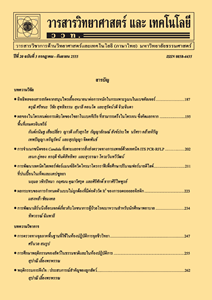ปัจจัยทำนายพฤติกรรมการสร้างเสริมสุขภาพในชุมชนกึ่งเมืองกึ่งชนบทแห่งหนึ่งในเขตปริมณฑลกรุงเทพมหานคร
Main Article Content
Abstract
บทคัดย่อ
การวิจัยเชิงสำรวจตัดขวางนี้มุ่งศึกษาความสัมพันธ์ของปัจจัยพื้นฐานต่อการทำนายพฤติกรรมการสร้างเสริมสุขภาพในประชากรอายุ 15 ปี ขึ้นไป ที่พบได้โดยสะดวกและยินดีตอบแบบสอบถาม ซึ่งอาศัยอยู่ในชุมชนกึ่งเมืองกึ่งชนบทแห่งหนึ่งในเขตปริมณฑลกรุงเทพมหานคร คือ จังหวัดปทุมธานี สำรวจในระยะเวลา 4 เดือน ได้จำนวนทั้งหมด 724 ท่าน ใช้แบบสอบถามโดยตอบด้วยตนเองประกอบด้วย 2 ส่วน คือ ข้อมูลพื้นฐานส่วนบุคคล และพฤติกรรมการสร้างเสริมสุขภาพเชิงบวกทั้งหมด 6 ด้าน วิเคราะห์ข้อมูลโดยใช้ความสัมพันธ์และสถิติถดถอยเชิงเส้นพหุคูณแบบขั้นตอน ผลการวิจัยพบว่าปัจจัยพื้นฐานที่มีความสัมพันธ์ทางบวกกับคะแนนพฤติกรรมการสร้างเสริมสุขภาพโดยรวม คือ อายุ ระดับการศึกษา และการเจ็บป่วยเรื้อรัง โดยปัจจัยทั้งสามมีอิทธิพลและร่วมทำนายพฤติกรรมการสร้างเสริมสุขภาพของประชาชนโดยรวมได้ร้อยละ 8.8 (adjusted R2 = 0.088) นอกจากนี้เมื่อวิเคราะห์ปัจจัยพื้นฐานที่มีอิทธิพลและร่วมทำนายคะแนนพฤติกรรมการสร้างเสริมสุขภาพรายด้าน พบดังนี้ (1) ด้านการสร้างสัมพันธภาพระหว่างบุคคล มี 3 ปัจจัย คือ อายุ ระดับการศึกษา และระดับความเครียด โดยร่วมทำนายได้ร้อยละ 4.6 (adjusted R2 = 0.046) (2) ด้านการเคลื่อนไหวร่างกาย มี 2 ปัจจัย คือ ระดับการศึกษา และการมีการเจ็บป่วยเรื้อรังประจำตัว โดยร่วมทำนายได้ร้อยละ 4.4 (adjusted R2 = 0.044) (3) ด้านการพัฒนาจิตวิญญาณ มี 2 ปัจจัย คือ ระดับการศึกษาและระดับความเครียดโดยร่วมทำนายได้ร้อยละ 4.4 (adjusted R2 = 0.044) (4) ด้านความรับผิดชอบต่อสุขภาพ มี 5 ปัจจัย คือ เพศ อายุ ระดับการศึกษา การมีการเจ็บป่วยเรื้อรัง และระดับความเครียด โดยร่วมทำนายได้ร้อยละ 10.8 (adjusted R2 = 0.108) (5) ด้านการจัดการความเครียด มี 3 ปัจจัย คือ อายุ ระดับการศึกษา และการมีความเจ็บป่วยประจำตัว โดยร่วมทำนายได้ร้อยละ 8.5 (adjusted R2 = 0.085) และ (6) ด้านโภชนาการ มี 3 ปัจจัย คือ อายุ เพศ และระดับการศึกษา โดยร่วมทำนายได้ร้อยละ 5.8 (adjusted R2 = 0.058) ตามลำดับ ยกเว้นปัจจัยรายได้และอาชีพ ไม่มีอิทธิพลร่วมทำนายต่อพฤติกรรมการสร้างเสริมสุขภาพอย่างนัยสำคัญ สรุปและข้อเสนอแนะ พยาบาลชุมชนและทีมสุขภาพนำข้อค้นพบที่ได้ไปเป็นแนวทางในการจัดอบรมให้ความรู้และทักษะสร้างความตระหนักต่อการรับผิดชอบต่อสุขภาพ เพื่อการสร้างเสริมสุขภาพร่วมกับการป้องกันการเจ็บป่วยเรื้อรัง โดยกลวิธีสุขศึกษานั้นควรให้เหมาะสมกับช่วงอายุ ระดับการศึกษา และภาวะความเจ็บป่วยของประชาชนในชุมชน
คำสำคัญ : พฤติกรรมการสร้างเสริมสุขภาพ; ชุมชนกึ่งเมืองกึ่งชนบท; ปริมณฑลกรุงเทพมหานคร
Abstract
The objectives of this descriptive cross-sectional survey design research were to determine the correlation and find out the factors influencing of health promotion behaviors. Seven hundred twenty-four convenient samples were recruited from general population aged over 15 years, who are living in a urban community of metropolitan Bangkok: Pathum Thani province. The periods of this study were four-months. The research instrument was comprised of the self-completed questionnaires, which contained two parts. The first part asked about demographic data. The second part was the health promotion behaviors. Data were analyzed using a correlation and stepwise multiple regression. Results of the study showed a positive statistically significant correlation between aged, educational level and having a chronic illness factors with total scores of health promotion behaviors (p<0.01 and p<0.05). Also, these three factors were the predictors as they all accounted for 8.8 percent of total health promotion behaviors. In addition that factors were the predictors to scores each of health promotion behaviors: (1) personal relationship; aged, educational level and stress level (adjusted R2 = 0.046), (2) Physical activity or exercise; educational level and having a chronic illness (adjusted R2 = 0.044), (3) Spiritual or mental intelligence; educational level and stress level (adjusted R2 = 0.044), (4) Responsibility for health; gender, aged, educational level, having a chronic illness and stress level (adjusted R2 = 0.108), (5) Stress management; aged, educational level and having a chronic illness (adjusted R2 = 0.085), and (6) Nutrition for healthy; gender, aged and educational level (adjusted R2 = 0.058) respectively. Beside income and occupational factors not showed statistically significant difference prediction with scores of health promotion behaviors at p<0.05. It was suggested the community health nurses and health team should to health educated awareness for preventing and promoting health, the issue was appropriated with aged educational level and conditioning chronic illness in the further study.
Keywords: health promotion behavior; urban community; metropolitan Bangkok


